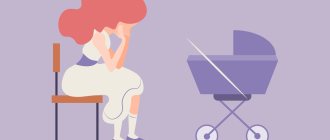- Symptoms of Depression in Teens
- How to deal with suicidal thoughts
- Talk about depression with a trusted adult
- Fighting depression on your own
- Helping a friend who is depressed
| Adolescence can be a very challenging and stressful time in your life. Feeling sad or irritable is completely normal. However, if these feelings do not leave and become stronger, then you are suffering from depression. |
Symptoms of depression in a teenager
Depression is much more common among teenagers than one might think. You are not alone, and depression is not a hopeless case. Even if it seems that depression will never go away, this is not so - with proper treatment and a healthy lifestyle, this day will come much sooner than you think.
It is difficult to explain in words what depression feels like because each person experiences it differently. However, there are common problems and symptoms that teenagers who are depressed face:
|
|
If these feelings become so unbearable that you see no other way out but to cause pain to yourself and your loved ones, you need to immediately seek help. Of course, it can be very difficult to ask for help when negative emotions literally overwhelm you, but this must be done, since it is very difficult to get out of depression on your own.
If you are a teenager and your friend constantly looks sad, depressed and at the same time indifferent to the world around him, you should suspect he is depressed. The following changes in behavior may also be warning signs of depression in a friend:
- Your friend no longer wants to do those things that previously brought you joy together.
- Your friend starts drinking alcohol, drugs, or hanging out with “bad company.”
- A friend starts skipping school.
- A friend starts talking about how bad, ugly, stupid or useless he is.
- A friend begins to talk frequently about death or suicide.
Advice from psychologists
When parents are unable to cope with a teenager’s depression, they need to seek help from a psychologist.
- Having a positive example. The child is told about people who should become a guide for him. For example, you can show his peers who have already achieved great success. However, a parallel must be drawn so as not to aggravate the situation and develop an inferiority complex.
- Increased self-esteem. Often the development of depression is caused by low self-esteem. Therefore, you will have to make every effort to make the child believe in his importance. Sometimes it’s worth contacting a psychologist who can help you work on this. If a teenager is worried about problems with his figure, you can send him to the gym, if because of acne, you can visit a cosmetologist.
- Family help. It is very important that a teenager who is depressed has supportive parents who are not indifferent to his fate. You need to surround your child with your care and love.
- It is necessary to properly organize a teenager’s leisure time. If a child spends a lot of time in some sections, in particular sports or creative ones, then he will not have depressive thoughts. The main thing is that the section is chosen taking into account the opinion of the teenager, and not according to the wishes of the parents.
- It is important to create a trusting relationship with your children, not to put pressure on them, not to control them unnecessarily, and to refuse overprotection.
- It is important to do everything to strengthen the self-esteem of your son and daughter and encourage their aspirations. Rejoice at the child’s successes, praise him, even for the slightest victories.
- Respect your teenager’s decisions and allow them to choose their own hobbies.
- Be interested in the life of your offspring, do not conflict with him.
- Show from your own experience how to cope with difficult situations in life.
Now you know what depression is in teenagers. As you can see, this condition cannot remain without the attention of parents. It is very important to promptly identify the presence of depression and, if necessary, seek help from a psychologist. Avoid this condition to avoid negative consequences.
How to deal with suicidal thoughts
The following tips will help you avoid making mistakes:
- There is always a way out, even if it is not visible right now. Many children who attempted suicide say that they did it only because they simply had no other option. At that time, they really did not see any other way out, however, in fact, they did not want to die. Remember, no matter how bad you feel, everything will pass over time.
- Thoughts about harming yourself or your loved ones do not make you a bad person. Depression can cause thoughts and feelings that are completely out of character for you. No one will judge or condemn you for these feelings if you are brave enough to talk about them.
- If your feelings are getting out of hand, tell yourself to wait 24 hours before taking any action. This will give you time to think and allow you to distance yourself from the problems that oppress you. During this 24 hour period, try to talk to someone you trust. Call a friend or hotline. What do you have to lose?
- If you are concerned about not being in control of your own emotions, never be alone. Even if you cannot express your feelings in words, try to be in crowded places, go for a walk with friends or spend time with loved ones, go to the cinema - in a word, do everything so as not to be alone.
First of all, do not make any attempts to harm yourself or loved ones. Think about the fact that suicide is an irreversible action, the problem is only a temporary moment. Help is available - all you need to do is take the first step and ask for it.
Talk about depression with a trusted adult
It may seem like your parents can't help, especially if they often fight and get angry because of your behavior. In fact, parents cannot bear to see their children suffer. They may feel frustrated because they don't understand what's happening to you and don't know how to help.
Many parents are not sufficiently aware of what depression is and how to recognize it in children. By telling your parents about your problem, you motivate them to help you.
If your parents don't understand you in any way, or if they have their own problems that prevent them from caring for you, turn to another adult, such as a teacher, relative or coach. This person will be able to help you reach your parents or refer you to the help you need.
If you still have no one to talk to, call the hotline, chat with specialists on the Internet, or contact special mutual aid groups.
No matter what, talk to someone, especially if you are having thoughts about harming yourself or others. Asking for help is the bravest and most correct step you can take, and it is also the first step towards recovery.
It can be very difficult to open up and share your feelings with someone - especially when you are depressed, feel worthless, hopeless or feel ashamed.
It is very important to understand that every person experiences similar feelings at some stage in their life. This does not mean at all that you are a weak person, fundamentally mistaken or bad. By accepting your feelings and sharing them with someone you can trust, you will feel less lonely.
Regardless of how you feel or think, people love and care about you, and if you have the courage to talk to them about your depression, you will undoubtedly feel much better. Some people think that talking about sad things makes them even more depressing, but in reality the opposite is true. It is very important and helpful to share your experiences with people who can listen and understand. It is not necessary that this person will be able to solve all the problems, but he can guide you to the correct solution - “one head is good, but two are better.”
Health of the Urals
The word “depression” is very fashionable among young people, in teenage culture. But in fact, you need to understand what a depressive state is and not confuse it with boredom and laziness. Together with Tatyana Filkova, a clinical psychologist at the Revda City Hospital, we figured out what depression is in teenagers and how parents can deal with it.
Depressive trends exist in music and poetry. Teenagers, due to their age, are drawn to such art; they have a need to look beyond the boundaries of life. And they associate depression with negative experiences. But depression is not only a psychological mood, it is also a physiological component.
— Signs of a depressive state are apathy, uncertainty, a feeling of helplessness. With depression, interest in life and significant problems disappears: what was previously relevant loses significance. In the literal sense, the “appetite” disappears when presenting yourself - indifference to clothes, hairstyle, and makeup appears, says Tatyana Vladimirovna.
Depression is often confused with laziness. Laziness is a lack of independence and boredom is the consequences of laziness. If I can’t educate myself, organize myself, I’m too lazy to do anything on my own. They don’t invite me anywhere, they don’t ask me for anything. When a child is used to doing something under the influence of a significant adult: a parent or teacher, he gets bored when there is no one nearby. No motivation to do anything. And then, growing up, the teenager comes to the conclusion that he has no picture of the future. He doesn't know what he wants.
The first signs of depression should alert parents. If a teenager’s behavior has changed, he doesn’t do what he did before, if he looks different outwardly, was successful, and suddenly his social activity decreases, he doesn’t want to get up in the morning, this is a reason to wonder if his depression has lasted longer ? The autumn period of depression has certain boundaries. As a rule, it cannot last more than a month. If this period drags on, you need to sound the alarm. Prolonged depression can lead to suicidal tendencies, self-flagellation - low self-esteem, it is very difficult to work with such clients in individual therapy, we involve family resources. Only significant loved ones can bring a teenager out of this state.
How can parents deal with teenage depression? It must be determined!” daily regime. Lying on the sofa from supposed fatigue will not help. He needs responsibilities, first of all, so let him do something, be responsible for something. Physical activity during periods of depression is mandatory.
Secondly, you need to distract and entertain the teenager. Go to the cinema together, somewhere else. Do it together. what interests a teenager. If your family had traditions of going out together, don’t break them. Everything must be done to ensure that during the autumn period a teenager has less time to be alone with himself.
If teenage depression is associated with relationships between peers, with falling in love, this is especially typical for girls, we often recommend reading literature about love - all the experiences are very well conveyed there, it works great, the teenager understands that experiencing such feelings is not scary. This happens to others too.
It is very important for parents to know what teenagers do in private: what they listen to, what they read, what websites they visit. If something is alarming, before criticizing something, you need to ask what attracts a teenager to this music, books, websites. And then, after listening to the child, you can express your opinion and give your recommendations. As a rule, beautiful pictures and invigorating music save you from depressive moods. At the subconscious level, they change the inner mood and help get out of depression. Presentation of oneself and facial expressions play a big role. It turns out that even if you force yourself to smile at others - stretch your lips in a smile, your inner mood will change at the physiological level. Clothes and surroundings have a strong influence. Don't be afraid of bright colors in teenagers' clothes and hairstyles. Externally coloring the world, they form an internal picture of the world around them, and depression disappears.
Fighting depression on your own
The key to treating depression is to start with small goals and then gradually achieve them.
Daily fight against depression
Depression is not your fault. However, you have some control over your feelings. Communication with friends and relatives, a healthy lifestyle and stress control will have a positive effect on your mood and help you get out of depression.
At the same time, you may need to take appropriate medications or medications to help control your feelings. Review possible treatment options with your parents. When considering treatment options, try to find out as much information as possible before making your final choice. Some antidepressants intended for adults may have a negative effect on adolescents.
Try not to isolate yourself from the world around you
When you are depressed, you may not want to see anyone or do anything. Even just getting out of bed in the morning can be very difficult, but isolation from the outside world only makes depression worse. Make it a rule to remain a socially active person, even if this is not at all what you want. When you go out in public, you will begin to feel much better.
Spend time with friends, especially those who are active and optimistic, who will help you feel better. Avoid communicating with those who take drugs or alcohol, or who can bring you trouble or make you feel insecure.
It will also be useful to limit the time you spend in front of the TV or computer playing various games online.
Take care of your body's health
A healthy lifestyle can do wonders for your mood. Things like exercise and healthy eating have been shown to be effective in fighting depression. Exercise stimulates the release of endorphins, which instantly makes a person feel happy. Physical activity can be as effective as medication or therapy for depression, so start exercising, dancing, or cycling. Any type of physical activity helps! Even a short walk can be beneficial.
When it comes to nutrition, poor diet can make you feel sluggish and tired, which can further worsen your symptoms of depression. The human body needs vitamins and minerals, especially iron and vitamin B. Try to fill your diet with a variety of vegetables, fruits and whole grains. Talk to your parents, doctor or school nurse to make sure your diet is balanced.
Avoid alcohol and drugs
You may try using alcohol or drugs in an attempt to get rid of depressing thoughts and improve your mood, at least for a short time. However, these substances can not only aggravate depression, but also cause it themselves. Alcohol and drugs also increase suicidal thoughts. In the long run, alcohol and drugs will only make things worse, not better.
If you are drug or alcohol dependent, seek help. These problems are treated with special medications and procedures that can be combined with treatment for depression.
Ask for help if you are stressed
Stress and anxiety can become very acute, even leading to depression. Talk to your teacher or school counselor if exams or homework are making you feel overwhelmed.
Likewise, if you have health problems that you cannot discuss with your parents - such as drug addiction or pregnancy - seek medical attention or consult with your doctor. A health professional can help find an approach to parents (if required) and provide appropriate medical care.
If you are having problems in your relationships, with friends, or with your family, talk to an adult you trust. There may also be a psychologist at your school who you can contact for help, or ask your parent to make an appointment with a psychotherapist.
Causes and consequences of depression in teenage girls
Practicing psychotherapists agree that the hormonal changes that occur in a girl’s body during puberty can itself serve as a trigger for the development of a depressive episode. The changes taking place involve the entire neuroendocrine system of the body with its complex connections. Due to unstable hormonal levels, not only somatic disorders occur, but also mental changes.
There is both a direct and inverse relationship between depression and hormonal changes. Thus, the risk of developing premenstrual dysphoria in girls appears immediately from the first menstrual bleeding. On the other hand, depression itself can cause hormonal imbalances. It has long been a known fact that during global disasters, many women lose the ability to conceive due to the cessation of menstruation.
The same can be said about “personal” disasters. For example, girls who have experienced a depressive episode have the following types of disorders:
- the formation of a normal monthly cycle occurs later than among peers - at 15-17 years old instead of 12-14;
- initially irregular periods (dysmenorrhea);
- disappearance of menstruation (amenorrhea).
In addition, depression during puberty means that episodes are more likely to recur in an adult woman. If a girl experiences a delay in the formation of the menstrual cycle, irregular periods or their absence, which is not associated with physiological pathologies and somatic diseases, we recommend paying attention to the emotional state of the teenager.
Helping a friend who is depressed
Depressed teenagers tend to rely more on their friends than on their parents or other adults. The situation may turn out to be such that the only person with whom your friend will be ready to share his feelings will be you. Although this may seem like a huge responsibility, there are many things you can do to help.
- Try to get in touch with a friend. Starting a conversation with someone about depression can seem difficult. We recommend starting with something simple, such as: “You look sad and don’t seem like yourself. I really want to help you. Maybe I can do something for you?
- Know that your friend is not expecting you to have all the answers. Most likely, your friend just needs someone who will listen and support him. Listening and responding in a non-judgmental, encouraging manner will provide the greatest help.
- Insist on the need to seek help. Urge your friend to talk to a parent, teacher, or counselor. Your friend may be scared and ashamed to admit his problems to an authority figure, but you have the power to convince him. If necessary, invite your friend to see a psychologist together.
- Try not to leave your friend alone. Depression can cause people to do and say things that are out of character and that hurt others. However, your friend is going through a very difficult time, so try not to take it personally. After receiving the appropriate help, he (or she) will become the same person he was before. Along with this, you need other friends or family to take care of you as well. Your feelings matter and deserve respect as well.
- Speak up if a friend is contemplating suicide. If your friend jokes or talks about suicide, starts giving away their own things, or tries to say goodbye, tell a trusted adult immediately. Now all responsibility for your friend falls on your shoulders. You need to act quickly and immediately. Even if you promised not to tell anyone, now your friend needs help. Let him be offended by you for some time, nevertheless, his life will be saved.









